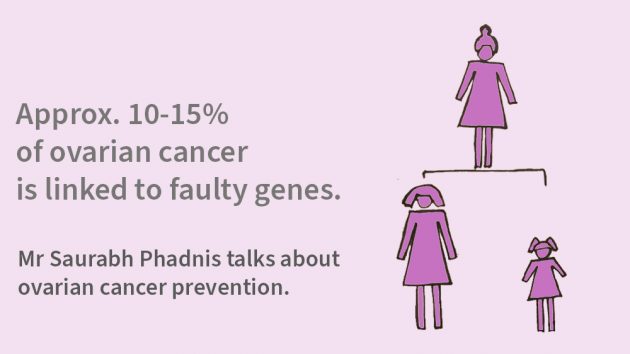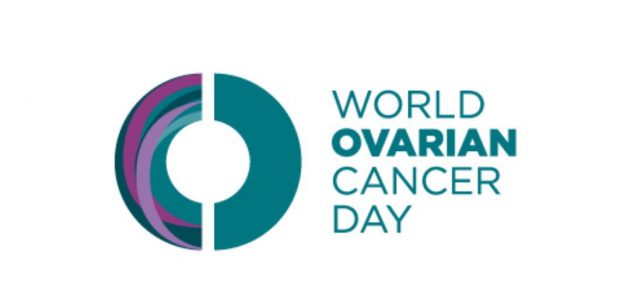
Ovarian cancer prevention: what you need to know
In the UK, approximately 7,500 women are diagnosed with ovarian cancer each year and it is the 6th most common cancer in women.
Our Consultant Gynaecologist and Gynaecological Oncologist, Mr Saurabh Phadnis, reveals why certain individuals ‘deemed more at risk,’ may want to consider preventative measures at the appropriate time or ‘gene testing,’ which could be vital in the prevention of this type of cancer. Mr Phadnis details why this is particularly important for people with a genetic link, having a family member diagnosed with ovarian or breast cancer.
What is ovarian cancer?
Ovarian cancer is when abnormal cells from the ovary grow in an uncontrolled way.
The ovaries are a pair of small organs located low in the tummy. Connected to the womb, the ovaries store a woman’s supply of eggs. It is believed that most cases of ovarian cancer arise from the fallopian tube, hence the term “tubo-ovarian cancer.”
How is it screened?
There is no reliable test to screen for ovarian cancer. At present there is no national screening programme. The UKCTOC trial, which was the largest randomised trial in screening for ovarian cancer, suggested multimodal screening using blood test for CA 125, using Risk of Ovarian Cancer Algorithm (ROCA) and transvaginal ultrasound at timely intervals (dependant on individual status) as an effective method. Further data is awaited.
Genetic screening is another method to determine the risk and may help with appropriate counselling and prevention.
Is it advisable for women to take preventative measures to best protect themselves? Why is this important?
For certain individuals, who have a genetic link to ovarian cancers, prevention can be offered at an appropriate time. This is individualised and should be offered after careful counselling. Determining the risk of ovarian cancer is important as surveillance strategy can be formulated according to one’s risk. Prevention is usually by surgery to remove fallopian tubes and ovaries. But this has to be timed appropriately to avoid adverse effects of menopause.
What do you advise women to do?
It is advisable to seek appropriate specialist advice if you think you are at risk of ovarian cancer or you wish to determine the risk of ovarian cancer. This is particularly important if you have a family member diagnosed with ovarian or breast cancer.
Who is most affected/more at risk? What makes someone more at risk of ovarian cancer?
Ovarian cancer is more common with older age and your risk increases if you have any of the following:
- Inherited genes that increase the risk of ovarian cancer include faulty versions of BRCA1 and BRCA2
- Women who have had breast cancer in the past
- Using hormone replacement after menopause
- Smoking, exposure to asbestos and radiation
- Certain medical conditions such as endometriosis and diabetes have an increased risk as does being overweight
If there is a family history of this type of cancer, does this make a person more at risk?
Yes, approximately 10-15% of ovarian cancer is linked to faulty genes. A fault in genes such as BRCA1, BRCA2, RAD51C, RAD51D and BRIP-1 are known to be linked with ovarian cancer.
Do you advise this for all women or is it specific to a certain age group /family history?
All women should be aware that they can access specialist advice, particularly if they feel anxious regarding their risk of ovarian cancer. Access to tests should not be limited to certain age groups or depend on family history.
Are men at risk? What action should men take?
BRCA mutation can also affect men and may be linked with increased risk of breast cancer, prostate cancer, pancreatic cancer and melanoma
What are the benefits of early screening (is it a blood test?)
Gene testing is a blood test. The benefit of having gene test is to formulate an individualised surveillance strategy. Your specialist will be able to offer screening for breast cancer in addition to ovarian cancer if appropriate.
What happens during a consultation/screening?
During the consultation, a detailed history including personal and family history is taken. Relevant test for example, blood test for gene testing and CA 125 may be requested. An ultrasound scan to check the ovaries may be requested. Test for ROCA (risk of ovarian cancer algorithm) may be requested. Follow up timelines discussed.
My early screening results are abnormal, should I be worried, what happens next?
When a test is abnormal, it is natural to have worries and questions. Please discuss with your specialist what the abnormal test means. Having an abnormal test does not mean you have cancer. It will help your specialist to allow counselling in a more effective manner and offer appropriate preventative measures.
Make an appointment
If you would like to book a consultation with Mr Saurabh Phadnis or any other member of the London Gynaecology team, please call 0207 10 11 700 or email [email protected]



